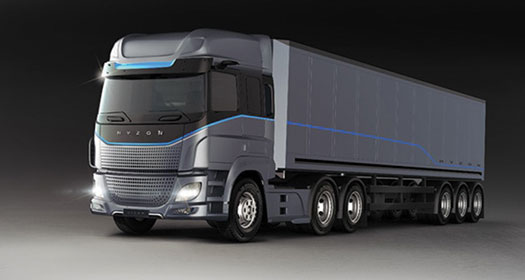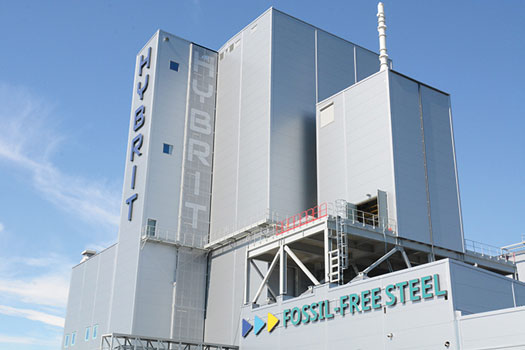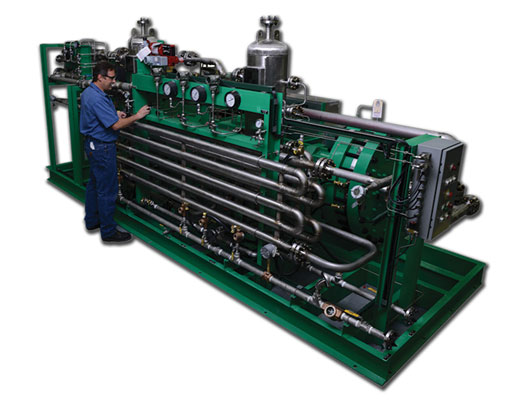Articles
Technology Spotlight
Technology Spotlight
GREEN H2
Raven SR to build first waste-to-H2 plant
Raven SR Inc., a renewable fuels company, has selected POWER Engineers Inc. and Stellar J Corp. to complete the final design, engineering and fabrication of the company’s first commercial renewable fuels production facilities, to be located in the San Francisco Bay area. The facilities will convert a blend of green waste and food waste into green H2 for the commercial transportation market.
Raven SR’s first commercial systems will produce up to 10,000 kg/d of renewable H2 from a blend of green waste and food waste that is being diverted from landfilling. Raven SR’s patented steam/CO2 reformation process makes it one of the only non-combustion waste-to-H2 processes in the world. Raven SR’s first commercial systems can reduce landfill waste by up to 200 tpd, converting it to nearly 10 tpd of renewable H2, which is enough to power around 200 heavy-duty trucks per day.
The Bay Area sites will also serve as the first two H2 hubs in a partnership between Raven SR and Hyzon Motors Inc. to fuel regional Hyzon fleets, and to supply H2 for commercial fuel stations in the region. Hyzon and Raven SR have announced the co-development of 100 H2 hubs in the U.S. and internationally.
LIQUEFACTION
Joule Processing commercializes ultra-efficient H2 liquefaction
Joule Processing has signed an exclusive partnership agreement with JTurbo Engineering and Technology to provide its twin-expander refrigeration technology for H2 liquefaction. Joule will utilize the technology to bring an ultra-energy-efficient H2 liquefaction plant to market.
The plant is the newest addition to Joule’s suite of modular process systems. The plants are capable of liquifying H2 for transportation at near-atmospheric pressure and temperatures below –400°F, with a minimum specific energy consumption.
Joule’s H2 liquefaction plant is designed specifically for the new H2 economy, featuring a compact, simple design. The technology liquefies H2 with very low energy consumption, utilizing JTurbo’s patent-pending twin-expander processes for both precooling and liquefaction and subcooling refrigeration cycles. At present, Joule is offering standardized H2 liquefaction plants at capacities of 10 metric tpd, 15 metric tpd and 30 metric tpd of liquid H2.
TRANSPORTATION/MOBILITY
Novel path toward zero-emissions shipping

Hydrogenious LOHC Technologies GmbH and Johannes Østensjø Dy AS recently founded the JV company Hydrogenious LOHC Maritime AS. The aim is to develop and market emissions-free liquid organic H2carrier (LOHC)-based applications for shipping and to have a commercial product ready for operation from 2025.
The focus is onboard LOHC/fuel cell propulsion systems on a MW scale. By binding the H2 to the LOHC, it will be a particularly safe technology. Hydrogenious’ LOHC applies to conventional bunkering facilities onboard, as well as in ports.
Funding agency Enova, owned by the Norwegian Ministry of Climate and Environment, will support the JV’s initial project, HyNjord, with NOK 26 MM (€2.5 MM).
Hyzon, RenewH2 collaborate on LH2 production

Hyzon Motors Inc. has signed an MOU with RenewH2 to collaborate on the supply and demand side of liquid H2 production. Under the MOU, RenewH2 plans to reform biogenic methane gas to generate H2. The H2 would then be liquefied and delivered to H2 fueling stations, which are expected to be developed in collaboration with Hyzon. Through this collaboration, the stations can be located near Hyzon customers to help provide consistent demand for the fuel.
Both companies are interested in expanding liquid H2 infrastructure due to its advantages over H2 gas. Because of its power density, liquid H2 is projected to provide a range approximately twice as far as 700-bar gaseous H2. The range for liquid H2 vehicles is expected to be up to 1,000 mi, based on Hyzon’s recently announced agreement to develop ultra-heavy-duty liquid H2-fueled trucks.
The greater range means fewer fueling stations, thereby reducing the need for liquid H2 to be transported to many locations. In addition, the refueling infrastructure capital and operating costs are expected to be lower when compared to gaseous H2, due to the elimination of the compression and refrigeration equipment.
RenewH2 is expected to begin producing H2 at its Wyoming facility in 2023, with ultimate capacity of 300 tpd using steam methane reformers. In addition to producing liquid H2, RenewH2 expects to store and deliver the fuel. Per the MOU, the fuel could be delivered by a fleet of Class-8 Hyzon trucks, owned and operated by RenewH2.
Hyundai to develop H2 fuel cell for mobile power
Hyundai Motor Co. signed an MOU with Hyundai Electric & Energy Systems Co. to develop an H2 fuel cell package for mobile power generation. Under the MOU, the two parties will develop an H2 fuel cell package dedicated for mobile power generators and alternative maritime power (AMP) supply solutions, based on Hyundai Motor’s polymer electrolyte membrane fuel cell (PEMFC) system that is used in Hyundai Motor’s fuel cell vehicles.
The new fuel cell-based package system is expected to be a game-changer in the mobile generator market, which is dominated by diesel generators. Environmentally friendly, distributed power solutions like the one planned can address carbon-neutral electric needs in a variety of industrial sectors such as port facilities, construction sites and industrial complexes.
Under the agreement, Hyundai Motor will supply PEMFC fuel cell systems and provide technical support, while Hyundai Electric will develop and commercialize a fuel cell-based power generation package, which includes mobile generators and AMP supply systems. Hyundai Electric will also explore a variety of business models for marketing the new package in South Korea and abroad.
Air Products, Cummins to accelerate development of H2 trucks
Air Products and Cummins Inc. signed an MOU to accelerate the integration of H2 fuel cell trucks in the Americas, Europe and Asia. Cummins will provide H2 fuel cell electric powertrains integrated into selected OEM partners’ heavy-duty trucks for Air Products, as Air Products begins the process of converting its global fleet of distribution vehicles to H2 fuel cell vehicles.
Following a successful demonstration and pilot phase, Air Products plans to convert its global fleet of approximately 2,000 trucks to H2 fuel cell zero-emissions vehicles. Cummins and Air Products expect the demonstration phase to begin in 2022. Additionally, Cummins and Air Products will work together to increase the accessibility of renewable H2, including H2 infrastructure opportunities that promote the adoption of H2 for mobility.
STORAGE
Howden to provide storage for steel pilot

Howden will deliver an H2 storage compression solution for HYBRIT, the world’s first fossil-free steel plant, in Svartöberget, Sweden. A joint project between Sweden’s SSAB, LKAB and Vattenfall, HYBRIT is the deployment of a pilot project for large-scale H2 storage.
Howden will supply a high-pressure diaphragm compression package to integrate the storage cycle of the H2 production. The H2 compression includes installation and commissioning of a packaged, three-stage diaphragm compressor.
The facility consists of a 100-m3 H2 storage built in an enclosed rock cavern approximately 30 m below ground. This offers a cost-effective solution, with the necessary pressure required, to store large amounts of energy in the form of H2.
TURBOMACHINERY/COMPRESSION
PPI compressors address key requirements for H2 applications

Sundyne’s PPI diaphragm compressors are being used for H2 applications around the world. PPI compressors are ideal for H2 applications for a number of reasons:
- High compression ratio: PPI diaphragm compressors are designed to meet the pressures required by mobility applications and industrial decarbonization projects.
- Product purity: PPI compressors feature triple diaphragm sets, which ensure that the process gas is isolated from the hydraulic oil. This provides absolute process purity for fuel cell applications.
- Reliability: Every process-contacting part in a PPI compressor is made from corrosion-resistant alloys, making them ideal for H2 processing.
- Environmental safety: The static seals in PPI compressors ensure zero leakage of process gas to the atmosphere, and PPI’s leak detection system immediately detects diaphragm or seal failure.
- Lower energy costs: PPI’s rugged crank cases and drive trains are designed to deliver maximum compression at the lowest energy cost.
- Support for industry standards: All PPI compressors meet API 618 standards.
- Explosion-proof certification: PPI compressors are certified to meet the various standards for explosion-proof environments worldwide.
- Custom engineering: Sundyne collaborates with customers to manufacture customized PPI systems that are optimized for the gas pressure, molecular weight, heat, corrosion and velocity of each application. Sundyne utilizes the latest technology in solids modeling and FEA analysis to ensure that all working components are designed and tested to minimize wear, improve sealing and reduce corrosive and erosive effects.
Siemens Energy to provide H2 turbines in Nebraska
Siemens Energy will provide two SGT6-5000F turbines to power Omaha Public Power District’s (OPPD’s) new Turtle Creek Station Peaking Plant in Papillion, Nebraska. The simple-cycle turbine facility will be used to modernize backup generation in OPPD’s fleet, which means that the plant will run only as needed to provide a reliable source of electricity for the community.
The turbines offer the ability to run on up to 30% H2 and biodiesel in support of future technology advancements. They also offer a fast start time and low emissions while helping rapidly stabilize transmissions systems to adjust for the variable output of solar generation.
Siemens Energy has set an ambitious target to have all its new gas turbines (including the SGT6-5000F) capable of burning 100% H2 on or before the end of 2030.

